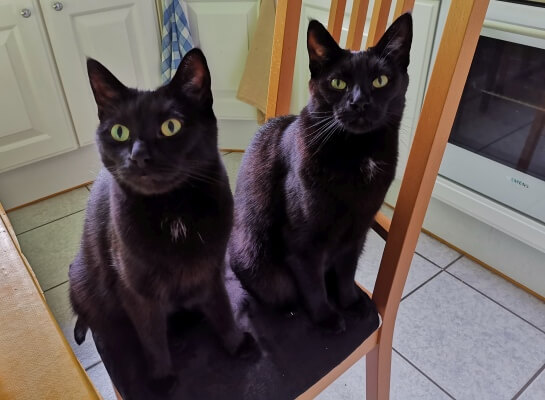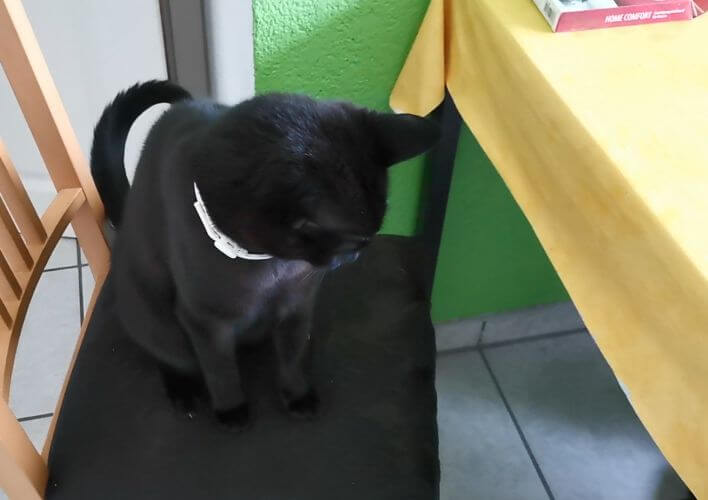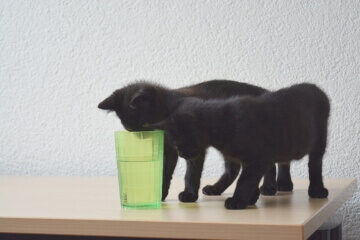Litter box problems in cats are not only one of the most common problems with cats, but also one of the worst. But what can you do if your cat pees outside the litterbox? How do you stop your cat from peeing all over your house?
Here’s everything you need to know about cats and litter box problems – and what we did to stop our cat from peeing in the house.
Why Do Cats Pee Outside The Litter Box?
Common reasons why cats pee outside the litter box are territorial or marking behavior, anxiety, and health issues. Your vet or a cat behavior expert can help you find the cause and aid you in finding a solution to stop the unwanted behavior.
Here’s a more complete list of reasons why your cat might be peeing outside the litter box:
- Cat is an intact male (marking behavior)
- Another cat is spotted through a window (marking behavior)
- Loud noise startled your cat while using the litter (anxiety)
- Litter box is not secluded enough or gets a lot of through-traffic (anxiety)
- Cat suffers from a UTI (health issue)
- Cat has dementia (health issue)
- Cat has been declawed
- Litter box is dirty
- Litter box has a strong unpleasant smell
- Litter is uncomfortable to the cat
Territorial Behavior (Marking)
One very common cause for cats urinating outside the litter box is an intact male marking his territory. Your best course of action in this case is to get your cat neutered as soon as possible. Neutering your cats brings them many health benefits, reduces aggression, helps in reducing feral cat populations (less so if your cat is an inside cat), and on top of all of this will also help stop unwanted marking behavior.
Sometimes, even neutered males will mark their territory, which if you’re unlucky can be the corners of your house, your bed, or anything else. If there is friction between two cats in your household, you might try to reduce their aggression by reintroducing them to each other or using Feliway diffuers within the house. Feliway diffusers contain artificial cat pheromones that can calm cats down.
If your cat can see the outside through a window and another cat regularly comes onto your property, this could also be a trigger for your cat to start marking his territory inside. Blocking off the view or shooing the other cat away until it stops coming to your yard can help in this case.
Anxiety
Many things can give your cats anxiety and prevent them from using their litter box normally. For example:
- Other cats threatening them
- Closed litter boxes that offer no escape route
- Startling noises or through-traffic near the litter box
If your cat does not feel safe using the litter box, he might not want to use it.
Litter Box With Lid
One trigger for this can be a bad experience if your cat got ambushed while using the litter box. Closed cat toilets with a lid on can feel particularly precarious to use for your cat, as the lid will block any escape route. Try taking the lid off the box and see if it helps, or buy a simple large litter box without a lid*.
Loud Noises
Your cat might also feel scared of the litter box if a sudden loud noise startled him the last time. This can happen if you put your litter box next to a washing machine or a boiler or other things that might suddenly spring into action. Similarly, self-cleaning litter boxes* can scare cats and lead to them refusing to use them. Make sure nothing scares your cat while it’s trying to use the litter box.
Through-Traffic
Lastly, your cat might want a quiet place to pee or poop, so having a litter box that’s tucked away can help. Don’t put the litter box in a busy hallway – or if you do, make sure another litter box is available in a more secluded space.
Health Issues
Health issues can also deter your cat from using the litter box. Taking your cat to the vet when it starts urinating outside the litter box is always a good first step.
UTIs
A urinary tract infection (UTI) can be another cause for litter box problems with your cat. If peeing hurts, your cat might associate the pain not with a health issue, but with the litter box itself. It will therefore look for another place to pee, like your floors, to see if this solves the problem.
If you suspect your cat might have a UTI or you can’t determine any other immediate cause for your cat’s litter box issues, take the cat to the vet so they can check it’s not a health issue.
Dementia
Similarly, very old cats might suffer from dementia or feline cognitive dysfunction and simply forget where their litter box is. Your vet can also give you tips on how to deal with this, but increasing the number of litter boxes in your home might help.
Declawed cats
Declawing cats means surgically removing part of their toes in order to remove the claws. It’s illegal in many countries and seen by many professionals as an extremely cruel practice that causes lots of agony and pain in the cat. Declawed cats might feel substantial discomfort when stepping into the litter box, which might lead them to avoid it.
Other
There are a few other reasons that could be a trigger for your cat peeing outside the litter box and which are neither medical nor anxiety-induced or territorial.
- Litter box is dirty
- Litter box smells unpleasant
- Litter is unpleasant or uncomfortable to the cat
Dirty litter box
Some cats don’t like using a litter box that already has urine or feces in it. This bothers some cats more than others, and the simple fix for this is to always clean the litter box after it’s been used. Alternatively, provide more litter boxes so your cat always finds a clean one. The general rule of thumb is have one litter box per cat, plus another litter box extra.
Litter box smells unpleasant
This is related to the previous point, and yet it is different: While a dirty litter box is full of poo or pee, a litter box can also be freshly scrubbed and not meet your cat’s standards. Using a detergent with a strong smell can put off cats, who have very fine noses.
When you do a thorough clean of the litter box, wash it out with water and maybe an enzyme cleaner, but try to avoid bleach or anything strong. Also try to refrain from using a new detergent your cats aren’t used to.
Litter is unpleasant
Litter can be unpleasant to cats in a variety of ways: Strong dust can cause them to sneeze, the texture might be unpleasant to their paws, or they don’t like the way it smells.
If your cat pees outside the litter box, try filling one of the litter boxes with a different litter and see if your cat starts using that. Litters come in a variety of sizes, there is likely something your cat will like. Try switching to sawdust pellets to see if your cat prefers it – and to save money:
Garry’s Story – How He Became A (Mostly) Clean Cat
After all this theory, let me tell you about our boy Garrus. Apart from some accidents Garrus had when he was small, he was a well-behaved cat for a long time. He accepted his litter box well.
However, after a few years we noticed that all of a sudden he had started peeing outside the litter box occasionally. He liked to choose old cardboard boxes and the corners of our rooms, once he peed in the middle of the room while we were right there watching him.

Cat pees behind the sofa
At some point we noticed that Garrus had peed in the corner behind the sofa several times. The floor (laminate) was slightly uneven and of course it stank to the high heavens.
We wiped it all up with an odor remover* to get the smell out and hopefully stop him from peeing their again. Unfortunately it didn’t take long for him to pee behind the sofa again.
A trip to the vet and Feliway
Next we took him to the vet. As stated above, it’s important to rule out any health issues when your cat suddenly starts peeing outside the litter box. Urinary tract infections can hurt your cat when peeing in the box, so he might pee ouside the litter box to see if it hurts less somewhere else.
Our vet couldn’t find anything wrong with Garrus, but recommended Feliway in case the peeing was caused by our two cats fighting. They do occasionally fight, but they also spend time lying next to each other or grooming each other.
So we bought a Feliway Diffuser Kit* to see i that would help. We didn’t have the impression that the cats fought any less, and the peeing unfortunately also continued.
Is the cat litter too dirty?
Next, we blocked off all the places Garrus peed in by putting down cardboard box, his cat carrier or something similar.
This worked to some degree, but he then started peeing at the front door, which is hard to block off. He also started peeing in the cat carrier, which was easy to clean but still annoying.
In most cases if a cat pees outside the litter box, this is due to problems with the litter box. So this is also something we looked at.
We tried out different types of cat litter and started cleaning the cat litter more often. (We scoop it several times a day, but then started washing out the cat toilet and adding fresh litter more often.)
We did not, however, find that there was any connection between the cleanliness of the cat litter and the cat’s peeing on the floor.
Even though our apartment is not particularly large, I ended up putting in a third litter box, as this is what Jackson Galaxy recommends. This is also something Pam Johnson-Bennett recommends in her excellent book Think Like A Cat*.
In the end, even that didn’t help. He peed in it once, but then peed right over it into the corner.
Using a calming collar

As the peeing seemed to get increasingly worse, we eventually bought a calming collar*. Ours was by a company called Felisept, but several other companies make similar collars.
These collars give off a particular scent, much like catnip pillows*, which calms cats down and supposedly doesn’t have any side effects. A friend of ours recommended the collar as he had used it for his cat who licked herself so much that her hair started falling out. The collar helped them immediately.
These collars only last about a month according to the description, so they’re not exactly cheap because you have to keep buying them. We were desperate at this point, though.
The collar definitely had an effect on the cats. They sniffed it and drooled all over the floor. While Garrus was wearing it, Wrex’ behavior to him changed and he’d occasionally jump at him and be aggressive.
So in the end, we took the collar off gain to prevent this. Also, one review on Amazon mentioned that their cat got their mouth caught up in the collar and injured himself and I didn’t want to risk it.
What you also need to consider if you’re using a calming collar is that you’re not really treating the cause, you’re treating the symptom. After all, if you’re stressed in life, it’s better to get rid of the stressors than to tranquilize yourself to get rid of the symptom.
I did cut the collar in half and put it on the most frequented pee spots in our apartment, though, in the hopes of associating the pee spots with positive feelings rather than with the smell of urine.
Clicker training our cat to stop peeing
At around the same time, I followed another piece of advice and tried to reward the cat whenever he used the litter box. This also goes back to Pam Johnson-Bennett’s book* in which she is very adamant that cats learn through positive reinforcement.
For this, I used a cheap clicker* I had bought previously to clicker-train my cats to give me their paw and do other tricks on command.
Whenever Garrus came to the bathroom with me – he often did this in the mornings or at dinner time – I watched for him to step into the litter box. When he eventually did and peed, I immediately used the clicker and gave him a treat.
At this point, I had already trained him to like the clicker, as mentioned in this article.
Garrus immediately understood the concept and in the next week or so tried to figure out what would cause me to reward him. Did stepping into the litter box work? Eventually he learned that only peeing in the litter box worked, stepping into it alone did not work.
And that was all it took! Since then, our cat eagerly uses the litter box and enjoys the reward he gets for it.
Note that at this point, we don’t always reward his peeing in the litter box – only if we’re there coincidentally, which happens often in the evenings before dinner. We’ve only found a pee once since then and so far since several months he has not re-offended.
Clicker training or Felisept – What helped?
There’s a little bit of ambiguity since the calming collar and the clicker training both happened at roughly the same time. I can’t be entirely sure that it was really the clicker-training that helped, but considering the fact that we never exchanged the collar and it’s only supposed to last for 30 days, my money’s on clicker-training.
If this doesn’t work for you, go over to my article Why does my cat pee everywhere? and maybe you’ll find a suggestion there that works for you. Also, don’t forget to take your cat to the vet to make sure the problem is not caused by a medical issue.
Don’t get stressed out
If you haven’t found the right solution for your cat yet, try not to stress out too much. I know it’s hard having a cat that destroys your furniture, your floor or your carpets, but it’s not your cat’s fault.
Cats don’t pee out of spite. If a cat pees outside the litter box, there likely is another reason for it and it’s important not to blame your cat or be aggressive towards him or her.
I know the stress my cat caused me for months whenever he went behind the sofa because I feared for the worst and constantly checked to see if he was peeing. No doubt your cat reacts to that sort of attention, and not always in the way you hope.
One Way To Avoid Stress
One thing that really helped me when we were still trying to find out why Garry peed outside the litter box and how to make him stop was to get pee pads* and put those in the pee spot. They may not look pretty, but you will take a lot of stress out of this situation of cleaning up after your cat is reduced to putting a pad in the washing machine or throwing it away (if you’re using single-use pee pads*).
Pee pads will help you take the emotion out of the situation and be a bit more relaxed if your cat has another “accident”.
I hope this helped you – best of luck with trying these tips for yourself. I hope this works as well for you as it has for us!
Balconycats.com is a participant of the Amazon Services LLC Associates Program, an affiliate advertising program. Links marked with an asterisk (*) are affiliate links. If you buy a product through an affiliate link, we will get a small commission without extra cost to you. This helps us earn an income off the free content we provide to you. Thank you for your support!


